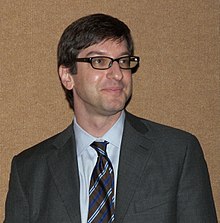David Laibson
| David Laibson | |
|---|---|

David Laibson in 2007.
|
|
| Born | June 26, 1966 |
| Nationality | American |
| Institution | Harvard University |
| Field |
Macroeconomics Behavioral economics |
| Alma mater |
Massachusetts Institute of Technology London School of Economics Harvard University |
| Doctoral advisor |
Olivier Jean Blanchard Roland Bénabou |
| Influences |
Benjamin M. Friedman Matthew Rabin |
| Influenced | Xavier Gabaix |
| Information at IDEAS / RePEc | |
David Isaac Laibson (born June 26, 1966) is a professor of economics at Harvard University, where he has taught since 1994. His research focuses on macroeconomics, intertemporal choice, behavioral economics and neuroeconomics. In 2016, he became chairman of the Harvard economics department.
Laibson is the son of Ruth and Peter Laibson, and grew up in Haverford, Pennsylvania. He received an A.B. (summa) from Harvard in 1988, studying under Benjamin M. Friedman, and went on to study at the London School of Economics (MSc. in Econometrics and Mathematical Economics) where he was a recipient of a Marshall Scholarship. He received his PhD from MIT in 1994 and joined the faculty at Harvard once he graduated. He has since gained tenure. He is married to the mathematician Nina Zipser, and they have a son, Max.
At Harvard, he teaches a popular undergraduate class on "Psychology and Economics." In addition he teaches graduate courses on macroeconomics, behavioral economics and dynamic programming. His research has been published in prestigious journals such as the QJE, AER, JEP, Econometrica, and Science. Laibson is perhaps best known within economics for his work on time inconsistency, especially his model of quasi-hyperbolic discounting. One of his most prominent early contributions has been the "Golden Eggs and Hyperbolic Discounting" paper in QJE, 1997 where he studied the intertemporal behavior of a time-inconsistent consumer. This work provides a tractable model for self-control problems, in which agents have difficulty sticking to their long-term goals. Agents in Professor Laibson's models generally value "commitment devices," such as 401(k) plans or housing equity, that let them accumulate assets without as much temptation to splurge. These models also explain the "debt puzzle," that American consumers demonstrate both short-run impatience and long-run patience in their lifecycle savings decisions. Laibson has since developed hyperbolic discounting research in many directions, from more advanced theoretical models to computational macroeconomics to conceptual applications.
...
Wikipedia
